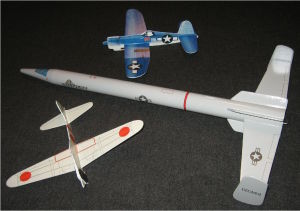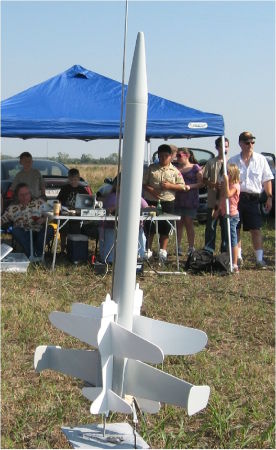| Construction Rating: | starstarstarstarstar |
| Flight Rating: | starstarstarstarstar |
| Overall Rating: | starstarstarstarstar |
| Manufacturer: | Squirrel Works  |

Brief:
This newest kit from Squirrel Works is simply awesome! It's a BT-55 kit that comes with two fantastically designed
parasite gliders fashioned to resemble the Corsair and Zero WWII fighter planes. The booster also bears resemblance to
a WWII bomber, uses 18mm motors and recovers with a big 18" mylar chute. The face card in the kit is another true
work of art, a signature of Squirrel Works kits. Parts quality is excellent, especially the decals. Don has found a new
source for these, and they are the best I have ever used. Thank goodness, too, as there are a lot of decals to apply.
They didn't take nearly as much effort to apply as I thought they would though, and they really make this kit stand
out. Building the kit was loads of fun, but flying the rocket is even more fun!
Construction:
The kit is loaded with parts:
- 1 BT-55 kraft main body tube
- 1 BNC-55 balsa nose cone
- 8 laser cut balsa sheets
- 1 standard 18mm motor mount kit with motor clip
- 2 standard 1/8" launch lugs
- 1 screw eye
- 2 small dowels
- 1 shock cord, 1/8" elastic
- 1 Kevlar® anchor
- 1 clay for balancing (but I didn't have to use any!)
- 2 pennies for glider nose weight
- 1 18" mylar parachute kit
- 7 decal sheets, water slide
You're going to need to clear off the build table for this one. There are a lot of parts, and if you skip around through the instructions you can build the gliders and the booster simultaneously as your waiting for glue to dry. Allow plenty of time. This isn't something you want to rush. Savor the build. It really is a fun kit to build.
 Since I would be skipping around in the instructions, I started off by reading
the instructions several times to get a clear mental picture of how everything went together. Next, I test fit all of
the parts and sanded for fit as needed, then sanded all the tubes and balsa, filling the balsa grain and tube spirals
with Elmer's Fill 'n' Finish to get that all out of the way in the beginning. I also papered the large booster wings
and fin tips using computer paper, applying CA along the edges to keep the edges smooth after rounding. Only a light
coat of filler was used on the glider parts to minimize weight. I built the balsa glider jigs after that. These are
awesome! They are designed to perfectly align the glider parts as you build them. The parts for the stand are laser cut
and tabbed, so it's a snap to put them together. I used rubber cement to hold them together, so I could pull them apart
once the gliders were finished so they would store easier. After that, I put the motor mount together and moved on to
put the glider wings together while the glue was drying. Be careful with the glue when putting the glider together or
you'll find them glued to the glider stand. A sharp hobby knife will separate them if you mess up on that though.
Since I would be skipping around in the instructions, I started off by reading
the instructions several times to get a clear mental picture of how everything went together. Next, I test fit all of
the parts and sanded for fit as needed, then sanded all the tubes and balsa, filling the balsa grain and tube spirals
with Elmer's Fill 'n' Finish to get that all out of the way in the beginning. I also papered the large booster wings
and fin tips using computer paper, applying CA along the edges to keep the edges smooth after rounding. Only a light
coat of filler was used on the glider parts to minimize weight. I built the balsa glider jigs after that. These are
awesome! They are designed to perfectly align the glider parts as you build them. The parts for the stand are laser cut
and tabbed, so it's a snap to put them together. I used rubber cement to hold them together, so I could pull them apart
once the gliders were finished so they would store easier. After that, I put the motor mount together and moved on to
put the glider wings together while the glue was drying. Be careful with the glue when putting the glider together or
you'll find them glued to the glider stand. A sharp hobby knife will separate them if you mess up on that though.
Next, I inserted the motor mount into the tube, and while that was drying I attached the glider wings to the fuselages and returned them to their stands to dry. Then I constructed the shock cord mount, inserted the screw eye, and cut out the marking guide and drew the alignment lines. I was very pleased to find that the kit included an 8+" length of flat Kevlar® to install in the shock cord mount. Very nice, as it is something I will add myself if not included. I put CA around the top half-inch of the inside of the forward end of the tube to protect against abrasion, then added a loop at the end of the Kevlar® to tie on the long 1/8" elastic cord. I attached the wing fins on the booster next, and as these were drying, I added the stabilizers and rudders to the gliders. The wing tips were added to the booster fins after that and the engine cowls, weight (a penny), and dowel were added to the nose of the gliders to complete their construction. This was really looking sweet and I was already getting anxious to fly it! Finally, the glider support fins and launch lugs were glued onto the booster: one launch lug was placed along one of the wings for launching, and the other one was cut in half and glued on to hold the gliders. Lastly, the shock cord was connected to the screw eye in the nose cone. Put the parachute together and you're done. Ready for finishing.
Finishing:
Finishing the booster is pretty standard. Primer, sand, primer, sand, and then paint the entire booster and its nose
a light gray. Finishing of the gliders needs to be careful as not to add or detract too much weight. I applied a light
coat of white primer on the gliders and then sanded most of that off before applying a light coat of gloss white.
Decals are next. I marked the back of the glider decal sheets to indicate orientation of the decals, as there are a lot
to put on. I also kept them in separate bags for each unit so I wouldn't mix them up. I test fit all of the glider
decals before removing to make sure they would easily fit where intended and trimmed as necessary. I also kept a hobby
knife and a pair of small trim scissors handy for minor adjustments after placement. I was really dreading putting on
the long fuselage decals as these have to go over the wings and then a narrow section has to go under the stabilizer.
It wasn't a problem though, as the decals lay down very easily, and I was able to move them fairly radically without
them coming apart. Nice job on the decals, Don! Next I applied a couple of coats of Future floor wax on the booster and
a light coat on the gliders to protect the finish and improve the shine. I was amazed. What would have taken days to
paint to get even a close resemblance to the glider markings was achieved in probably less than an hour for each
glider. They look fantastic, even if I do say so myself!
Construction Rating: 5 out of 5
Flight:
I didn't get a chance to put the decals on for the Dogfight's first launches. My first launch was on a B6-2. Nice
slow boost with the gliders releasing perfectly at apogee and gliding down in lazy circles for near perfect landings
and the booster touching down beautifully under the big 18" red mylar parachute. On the next flight, Don and I
flew our gliders in a drag race, both boosting on B6-2s. Nice slow boost and perfect deployment of the gliders at
apogee. Almost everybody at the field stopped to watch it. It almost looked like a real dogfight with the gliders
circling and crossing time and again above the field. Wow! I have never seen a flight get as many 'oohs' and 'aahs' as
that one did. The excitement level flying this rocket is off the chart.
Recovery:
The chute is perfect for the booster and the gliders flew perfectly.
Flight Rating: 5 out of 5
Summary:
The Dogfight is a great kit. Instructions are clear and well illustrated. Parts quality is superb, and the decals
look fantastic. The specially designed laser-cut glider jigs are a fantastic building aid. Squirrel Works kits are
always fantastic, but this one has a coolness factor that is only rivaled by their Police Call Box.
PROs: A simple design that has been engineered into a pure work of art, a set of quality parts with laser cut fins, excellent instructions, a nice long shock cord with a Kevlar® anchor, and a very reasonable price. The gliders flew perfectly "out of the box" with no trimming whatsoever. The decals really bring this kit to life, and they are superb!
CONs: I can't think of a single one.
Overall Rating: 5 out of 5
Other Reviews
- Squirrel Works Dogfight By Chan Stevens (December 27, 2008)
Brief: Squirrel Works has followed up their very popular Red Baron glider with another cool historic-themed glider kit, though this one includes TWO dueling gliders, a Corsair and a Zero. It's a reasonably simple kit to put together and the gliders are minimal effort. So if you're looking for an easy diversion from the basic 3FNC rocket and a serious "wow" factor, grab ...
 |
 |
Flights
 |
 |
 |
 |
D.M. (January 2, 2009)